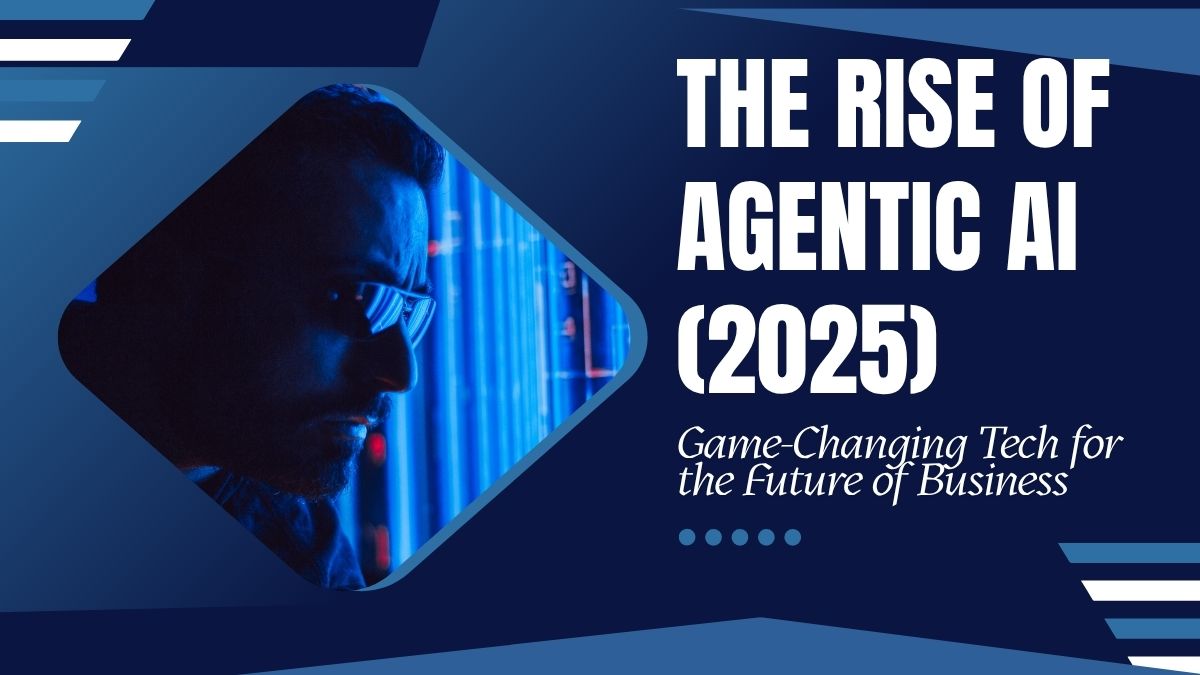The Rise of Agentic AI: How Self-Operating Systems Will Reshape Business

Agentic AI refers to autonomous, goal-driven systems that act independently to achieve specific outcomes. Unlike traditional AI models that rely on user prompts, Agentic AI can plan, execute, and adapt workflows on its own. In 2025, businesses are beginning to use these self-operating systems for customer service, marketing automation, cybersecurity, and operations—unlocking new levels of efficiency and innovation.
We’ve entered a new phase of artificial intelligence — where machines don’t just respond to instructions but actually act on their own. This paradigm, known as Agentic AI, represents a massive leap from generative tools like ChatGPT or Jasper.
In 2025, companies across industries are experimenting with self-operating AI systems that can plan marketing campaigns, analyze customer data, or even make purchasing decisions — all autonomously.
But what exactly makes Agentic AI different, and how will it reshape business in the years ahead?
What Is Agentic AI?
Agentic AI is the next evolutionary step of generative AI. Instead of passively waiting for user prompts, these systems think, plan, and act toward a defined goal.
They combine:
- Cognitive reasoning (understanding goals)
- Tool use (executing tasks across platforms)
- Feedback loops (improving performance autonomously)
In short, Agentic AI acts like a digital employee that never sleeps, learns continuously, and executes complex, multi-step tasks.
How Agentic AI Differs from Generative AI
| Feature | Generative AI (e.g., ChatGPT, Jasper) | Agentic AI (e.g., Devin, AutoGPT, BabyAGI) |
|---|---|---|
| Input | Needs human prompts | Works toward goals autonomously |
| Execution | Single-task (content generation, etc.) | Multi-step workflows |
| Learning | Trained on static data | Learns dynamically from environment |
| Outcome | Text, code, or image output | Completed task or decision outcome |
Generative AI is like a talented assistant — Agentic AI is like a self-managed employee.
Agentic AI in Action: Real Business Use Cases
In 2025, real-world deployments are already reshaping how organizations work.
1. Customer Support Automation
Agentic systems integrate with CRMs to handle customer queries end-to-end. They don’t just reply — they can create tickets, process refunds, and follow up automatically.
2. Marketing Campaign Management
AI agents can plan and launch email or social media campaigns without human input. They analyze engagement metrics and adjust creative strategies in real time.
3. Cybersecurity Defense
Agentic AI bots can detect, isolate, and neutralize threats instantly. They also learn from new attack patterns — making digital defense proactive instead of reactive.
4. E-commerce Operations
AI-driven “shop managers” monitor inventory, price changes, and competitor listings — automatically updating catalogs and running promotions.
5. Software Development
Projects like Devin (by Cognition Labs) demonstrate how AI can autonomously write, debug, and deploy code. These agentic systems act as junior developers working around the clock.
Why Businesses Are Adopting Agentic AI
- Efficiency: Reduces repetitive human work by 60–80%.
- Consistency: Eliminates human error in mission-critical workflows.
- Speed: Executes thousands of micro-decisions in seconds.
- Scalability: Allows small teams to operate like large enterprises.
- Cost Savings: Cuts operational costs by up to 40% in automation-heavy industries.
As enterprises aim to optimize every workflow, Agentic AI becomes the next frontier in digital transformation.
Challenges & Ethical Concerns
Of course, full autonomy introduces complex questions:
- Accountability: Who’s responsible if an AI agent makes a bad business decision?
- Bias: If models learn from biased data, they can replicate poor judgments at scale.
- Security: Self-operating systems may become targets for hijacking or data poisoning.
- Job Displacement: Routine administrative and marketing roles may shrink as AI takes over repetitive work.
The key is to balance innovation with oversight — building transparency, audits, and human checkpoints into AI systems.
How Companies Can Prepare for Agentic AI
If you’re running a business, here’s how to get ready for this new era:
- Audit Your Workflows – Identify repetitive, rule-based processes.
- Start with Semi-Autonomous Tools – Tools like Zapier, Make, or HubSpot AI can bridge the gap.
- Invest in Data Infrastructure – Quality data determines how well agents perform.
- Train Teams in AI Literacy – Ensure employees understand how to manage AI collaboration.
- Set Ethical Guidelines – Create policies for accountability, transparency, and usage limits.
Agentic AI in 2025 and Beyond
By 2026, experts predict that 30% of enterprise software will include built-in agentic capabilities. These systems will communicate, coordinate, and complete projects with minimal supervision.
Imagine a marketing department run by AI agents — one writes the copy, another analyzes data, a third manages budgets — all working together autonomously. That’s not science fiction anymore; it’s the emerging business reality.
As TechFily.org continues to track these breakthroughs, we’ll cover practical adoption tips, top tools, and ethical frameworks to help you stay ahead of this revolution.
Conclusion
Agentic AI marks a shift from tool-based intelligence to goal-driven autonomy.
Businesses that embrace this shift early will gain a powerful edge in efficiency, creativity, and decision-making.
The future isn’t about humans being replaced — it’s about humans collaborating with self-operating systems to achieve more than ever before.
